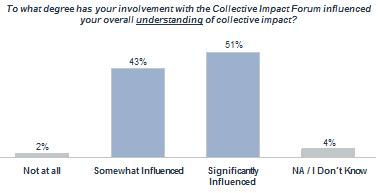Earlier this year, the Collective Impact Forum gathered feedback through its first annual survey of members who have created an online profile. We very much appreciate the 244 people who responded to the survey. The purpose of this baseline survey was to assess the Forum’s progress to date and to better understand needs in the field.
Almost half of respondents self-identified as backbone leaders and staff, and the majority of respondents were in the more nascent stages of their collective impact journey (e.g., 14% had not yet initiated a collective impact and were just exploring the concept, and 42% were in the early years of developing a collective impact initiative).
 A few notable results about the Forum’s progress:
A few notable results about the Forum’s progress:
- The Forum has influenced over 90% of survey respondents’ understanding of collective impact and 80% of respondents’ practice of collective impact.
- 99% of respondents who downloaded a resource on the Forum’s website say the resource is useful or very useful.
- 77% of respondents have shared a resource or publication.
- In-person convenings received high praise (e.g., 90%+ said convenings hosted by the Forum influenced their collective impact practice).
 While many respondents were grateful for the Forum’s online resources and in-person convenings, opportunities exist to strengthen engagement online. For example, 76% of respondents said that potential feedback from an expert or thought leader would be motivating or very motivating to them to participate more in the Forum’s online community. In response to this feedback, we have created a new “Ask Me About” feature, where each month, experts from across the social change field will stop by to answer your questions on a specific topic.
While many respondents were grateful for the Forum’s online resources and in-person convenings, opportunities exist to strengthen engagement online. For example, 76% of respondents said that potential feedback from an expert or thought leader would be motivating or very motivating to them to participate more in the Forum’s online community. In response to this feedback, we have created a new “Ask Me About” feature, where each month, experts from across the social change field will stop by to answer your questions on a specific topic.
Another suggestion from survey respondents was to focus on priority topics such as community engagement, equity, and leadership in future conveningsa and webinars. All three of these topics are central themes at our Collective Impact Funder Convening on May 4-6 in New Orleans. We will be offering a free live-stream of the featured session in New Orleans, “Equity Matters in Collective Impact” on Wednesday, May 6, from 9:00-10:45am EST. Visit the events page for more details on joining the live stream.
Other priority topics that emerged from the survey included:
- Capacity building: Supporting partners to build the skills they need for effective collective impact engagement (e.g., system leadership skills; collecting, analyzing, and using data; collaborative mindsets.
- Evaluation: Understanding how to evaluate collective impact initiatives at various stages.
- Multiple initiatives in one place: aligning or coordinating existing collaboratives with larger, more comprehensive collective impact efforts in a way that does not duplicate existing work.
- Effectiveness: Maintaining rigor and quality with collective impact efforts.
Beyond sharing feedback on the Forum’s in-person and online resources, survey respondents also shared valuable feedback about their collective impact efforts and priority issues they want to address in 2015. Key findings include:
- Collective impact efforts have made the most progress with developing a common agenda and the least progress with shared measurement. However, those who are farther along with their collective impact initiatives are making progress with shared measurement: 41% of early stage efforts have not yet initiated shared measurement, whereas more than 90% of mid stage efforts are already developing or implementing shared measurement.
- Nonprofits are most engaged and businesses are the least engaged stakeholder group in collective impact efforts. 40% of respondents said that they are engaging nonprofits as co-leaders, compared to 12% of respondents who said that they are engaging the business sector as co-leaders in collective impact efforts.
- Many collective impact efforts are contributing to behavior changes and systems changes. While many respondents are fairly early on their collective impact journey, 44% of survey respondents said their collective impact efforts have contributed to behavior changes or systems changes. Most commonly cited behavior changes included change in professional practice, more partnering, and change in culture. Systems changes that were commonly referenced included change in funding flows and changes in policy.
Thank you again to those who completed the survey. Your feedback has provided valuable insights on the Forum’s work and needs in the field.
Do you have any other suggestions or feedback for us to better support the collective impact field?
